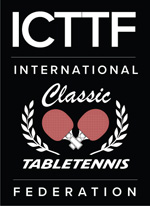Closing Out a Match
I had an interesting discussion recently (via Facebook chat) with Gabriel Skolnick, a 2200 player from Pennsylvania who had been serving up 10-8 match point on Marcus Jackson (a 2450 player) this past weekend at the 11th Annual Holiday Classic Team Tournament in Pennsylvania. (We won't talk about the edges at the end, Marcus you lucky devil!) What type of serves should a player use to close out a close match?
Before we get to the serve itself, let's look at the mental aspect. A good serve probably won't help you if you are a nervous wreck. (Not unless you can get an outright miss or a ball so easy even a nervous wreck can't miss.) So first thing to do is learn to play relaxed at the end of a close match. That's sports psychology - you might want to check out the articles in the Sports Psychology section in the Articles page. (See the link to Dora Kurimay's website, which is devoted to sports psychology for table tennis players.)
As to the serves themselves, you have two basic choices. Should you go for a serve where you're pretty sure you'll get a ball you can attack, or get into the type of rally you want to get into? Or do you want to go for a "surprise" serve, and perhaps get an easy point? Let's look at surprise serves first.
The advantage of a surprise serve is it's basically a free point. It's supposed to force an outright miss or an easy pop-up. The down side is that surprise serves are generally all or nothing - either you get the easy point, or the opponent takes the initiative off it, usually attacking it. For example, a fast, deep serve can often force a miss, but it can also be looped. A short side-topspin serve can be popped up, but it can also be flipped aggressively.
There is a place for surprise serves, and you are handicapping yourself if you don't use them. But use them sparingly; overuse allows an opponent to get used to them. At the higher levels, surprise serves become less and less effective as stronger opponents are less often "surprised."
So what about your other serves? A major task for you during a match is to find out what serves you can use effectively against the opponent. If you like to loop pushes, and your opponent pushes your backspin serves long, then at the end, when it's close, guess what? Serve backspin and loop! If you like to serve and hit, perhaps serve topspin or sidespin. Others like to serve short, low no-spin serves, which are surprisingly difficult to flip or push effectively. Everyone's different; find out what serves work for you in general, and what serves work in the match you are playing. Develop confidence in following up these serves, and soon you'll not only be closing out those close matches, but you'll be winning easily where before you had close matches.
So closing out a match is a combination of sports psychology (playing relaxed and loose at the end) and knowing what tactics to use and having confidence in those tactics.
The Carrot & Celery Diet
On Dec. 26, 2010 - 24 days ago - I weighted 196 pounds. This morning I hit 186. My "secret"? I'm on the carrot and celery diet. I tend to snack a lot, often on foods that are high in calories. Now I'm snacking on carrots and celery. When I get sick of carrots, I eat celery; when I get sick of celery, I eat carrots. When I'm sick of both . . . I close my eyes and eat both. I'm also drinking water instead of Nestea. I'm going for 180 pounds. (I'm also exercising, though not as much as I should. I play table tennis 3-4 times a week, and shadow practice my shots about five minutes each day to get the blood going. I've also taken to doing 20 pushups each morning. I should do situps and other exercises as well, but I'm too lazy.
Coaching News
- Are you on Facebook? Why not friend "ITTF Development"? Lots of interesting news there!
Send me your own coaching news!







